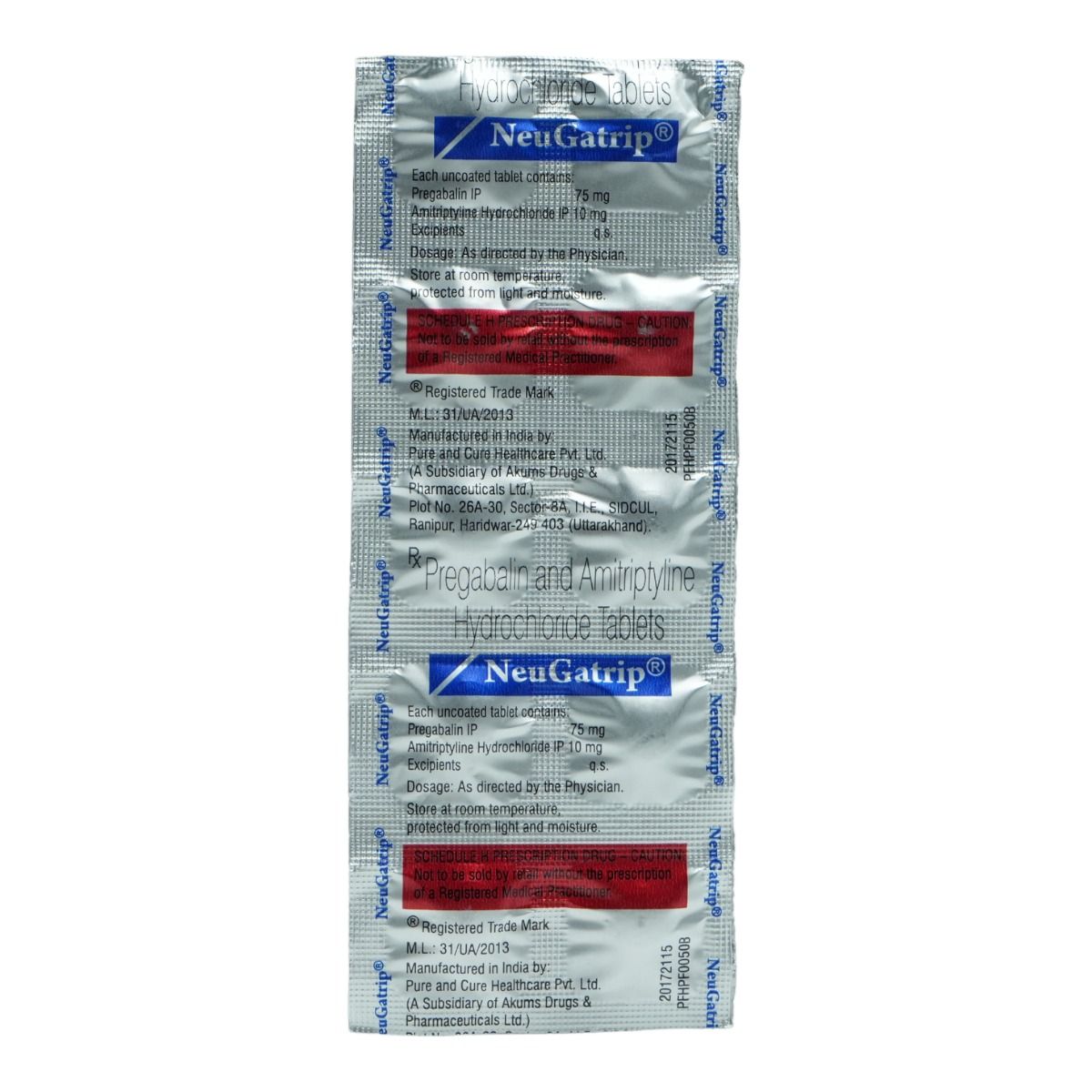Pregabalin+amitriptyline
About Pregabalin+amitriptyline
Amitriptyline+pregabalin is a combination medicine indicated for the management of neuropathic pain. Neuropathic pain is a chronic progressive nerve disease which causes nerve pain due to nerve damage or a malfunctioning nervous system. The pain could be intermittent or continuous, which is felt as a prickling, stabbing, tingling or burning sensation.
Amitriptyline+pregabalin is a combination of two drugs: Pregabalin (anti-convulsant), and Amitriptyline (antidepressant). Pregabalin works by binding to the specific site on voltage-gated calcium channels; this helps in relieving nerve pain. Amitriptyline increases the level of serotonin and noradrenaline, thereby decreasing the movement of pain receptors. Together, Amitriptyline+pregabalin helps to treat neuropathic pain.
You are advised to take Amitriptyline+pregabalin for as long as your doctor has prescribed it for you, depending on your medical condition. In some cases, you may experience certain common side-effects such as weight gain, dry mouth, blurred vision, dizziness, tiredness, nausea, vomiting, diarrhoea, and constipation. Most of these side-effects do not require medical attention and will resolve gradually over time. However, you are advised to talk to your doctor if you experience these side-effects persistently.
Consult your doctor if you are pregnant or breastfeeding. Amitriptyline+pregabalin may cause drowsiness and dizziness, so drive only if you are alert. Amitriptyline+pregabalin should not be given to children as safety and effectiveness have not been established. Avoid consuming alcohol along with Amitriptyline+pregabalin as it could lead to increased dizziness and sleepiness. Keep your doctor informed about your health condition and medicines to rule out any side-effects.
Uses of Pregabalin+amitriptyline
Medicinal Benefits
Amitriptyline+pregabalin is a combination of two drugs: Pregabalin (anti-convulsant), and Amitriptyline (antidepressant). Pregabalin works by binding to the specific site on voltage-gated calcium channels; this helps in relieving nerve pain. Amitriptyline increases the level of serotonin and noradrenaline, thereby decreasing the movement of pain receptors. Together, Amitriptyline+pregabalin helps to treat neuropathic pain.
Directions for Use
Storage
Side Effects of Pregabalin+amitriptyline
- Weight gain
- Dry mouth
- Blurred vision
- Dizziness
- Tiredness
- Nausea
- Vomiting
- Diarrhoea
- Constipation
Drug Warnings
Do not take Amitriptyline+pregabalin if you are allergic to any of its contents; if you have taken MAO inhibitors in the last 14days. Inform your doctor before taking Amitriptyline+pregabalin if you have/had heart problems, bipolar syndrome, severe liver disease or porphyria. Consult your doctor if you are pregnant or breastfeeding. Amitriptyline+pregabalin may cause drowsiness and dizziness, so drive only if you are alert. Amitriptyline+pregabalin should not be given to children as safety and effectiveness have not been established. Avoid consuming alcohol along with Amitriptyline+pregabalin as it could lead to increased drowsiness and sleepiness.
Drug Interactions
Drug-Drug Interactions: Amitriptyline+pregabalin may interact with antidepressants (duloxetine, sertraline, escitalopram), pain killers (fentanyl, hydrocodone, morphine, oxycodone, acetaminophen), anti-convulsant (topiramate), anti-anxiety (alprazolam), sedative-hypnotics (zolpidem), antihistamine (diphenhydramine, cetirizine), muscle relaxant (cyclobenzaprine), thyroid hormone (levothyroxine).
Drug-Food Interactions: Avoid alcohol consumption while taking Amitriptyline+pregabalin as it might cause increased dizziness and sleepiness.
Drug-Disease Interactions: Inform your doctor if you have suicidal tendency, angioedema, creatine kinase elevations, heart problems, depression, fits, pheochromocytoma (tumour of the adrenal gland), bone marrow suppression, tardive dyskinesia (involuntary facial movements), glaucoma, schizophrenia, bipolar disorder, thyroid problems, urinary retention, kidney or liver problems.
Drug-Drug Interactions Checker List:
Safety Advice

Alcohol
unsafeAvoid consumption of alcohol while taking Amitriptyline+pregabalin as it may increase drowsiness and sleepiness.

Pregnancy
cautionPlease consult your doctor if you have any concerns regarding this, your doctor will prescribe only if the benefits outweigh the risks.

Breast Feeding
cautionConsult your doctor before taking Amitriptyline+pregabalin; your doctor will decide whether Amitriptyline+pregabalin can be taken by breastfeeding mothers or not.

Driving
unsafeAmitriptyline+pregabalin may cause drowsiness, sleepiness and blurred vision. Do not drive or operate machinery unless you are alert.

Liver
cautionDose adjustment may be needed in patients with liver impairment. Please consult your doctor if you have a liver impairment or any concerns regarding this.

Kidney
cautionDose adjustment may be needed in patients with kidney impairment. Please consult your doctor if you have kidney impairment or any concerns regarding this.

Children
cautionAmitriptyline+pregabalin should not be given to children as the safety and efficacy have not been established.
Habit Forming
Diet & Lifestyle Advise
Include food rich in vitamin B and D in your diet.
Include cayenne pepper in your diet as it can help in lowering neuropathic pain.
Exercising regularly helps in improving overall health and combating pain.
Rest well, and get plenty of sleep.
Try taking a warm bath, as it can be soothing.
Avoid smoking and alcohol consumption.
Meditation and yoga can help lower stress, decrease pain sensitivity and improves coping skills.
Acupuncture can be helpful by stimulating pressure points.
Using essential oils for massages can help increase circulation.
Patients Concern
Disease/Condition Glossary
Neuropathic pain: Neuropathic pain is caused due to damage to sensory nerves. It is caused by chronic progressive nerve disease or due to infection or injury. The pain could be intermittent or continuous, which is felt as a prickling, stabbing, tingling or burning sensation. A feeling of numbness and loss of sensations is also common with neuropathic pain. Usually, the body sends the pain signals when there is an injury, but with neuropathic pain, the pain is not triggered by an injury; the body unpromptedly sends the pain signals. Symptoms include spontaneous, untriggered pain, unpleasant feeling, shooting, burning or stabbing pain, difficulty resting or sleeping, and evoked pain (pain caused by events usually not painful).
FAQs
Amitriptyline+pregabalin is used for the management of neuropathic pain. Neuropathic pain is a chronic progressive nerve disease which causes nerve pain due to nerve damage or a malfunctioning nervous system.Â
Amitriptyline+pregabalin may cause weight gain due to an increase in appetite. Maintain a healthy weight by regular exercise and following a proper diet.
Dry mouth could be a side-effect of Amitriptyline+pregabalin. Limiting caffeine intake, avoiding smoking and mouthwashes containing alcohol, drinking water regularly, and chewing sugar-free gum/candy might stimulate saliva and prevent drying of the mouth.
To treat your condition effectually, continue taking Amitriptyline+pregabalin for as long as prescribed. Do not be reluctant to speak with your doctor if you feel any difficulty while taking Amitriptyline+pregabalin; your doctor will reduce the dose gradually.
Amitriptyline+pregabalin is used to treat neuropathic pain due to diabetic neuropathy. Diabetic neuropathy is a condition in which nerve damage occurs due to high blood glucose levels. It mostly damages the nerves in legs and feet.
Amitriptyline+pregabalin may cause sexual disturbances such as decreased sex drive and problems with erection. Consult your doctor if you have any concerns regarding this.
Amitriptyline+pregabalin contains Pregabalin and Amitriptyline. Pregabalin works by binding to the specific site on voltage-gated calcium channels; this helps in relieving nerve pain. Amitriptyline increases the level of serotonin and noradrenaline, thereby decreasing the movement of pain receptors. Together, Amitriptyline+pregabalin helps to treat neuropathic pain.
Amitriptyline+pregabalin is a combination of two drugs: Pregabalin (anti-convulsant), and Amitriptyline (antidepressant). Helps in the management of neuropathic pain.
To manage weight gain associated with the use of Amitriptyline+pregabalin, focus on healthy habits such as consuming nutrient-dense foods, limiting your intake, and frequent exercising. Additionally, stay hydrated and get sufficient sleep. Also, seek advice from your doctor regarding weight management.
Amitriptyline+pregabalin may cause sleepiness or drowsiness as it is a common side effect in some individuals. To ensure your safety, rest for a while after taking Amitriptyline+pregabalin and avoid driving. In most cases, sleepiness or drowsiness vanishes as your body adjusts to the medication. If the sleepiness or drowsiness worsens or persists, consult your doctor for guidance.
The use of Amitriptyline+pregabalin may rarely cause turn urine colour to blue or green. If you notice any unusual changes, inform your doctor.
In rare cases, some side effects of Amitriptyline+pregabalin may become serious in some individuals including severe blurred vision, dizziness, stomach issues like nausea and vomiting, and unusual weight gain. If you experience any of these, seek medical help.
Usually, Amitriptyline+pregabalin starts working within a few weeks, but it may vary from person to person depending on individual condition, response, and dosage. Always follow your doctor's instructions.
If you forget a dose of Amitriptyline+pregabalin, take it immediately when you remember. But, if your next dose is nearer, skip the missed dose and continue with your regular schedule. Never double dose to make up for a missed dose, as this may increase side effects.
If you take too much Amitriptyline+pregabalin by mistake, please contact your doctor or emergency services immediately. Overdose symptoms may include drowsiness, confusion, and changes in heartbeat.
No, higher than the recommended dose of Amitriptyline+pregabalin does not provide more effectiveness or additional relief. Instead, it may increase the risk of adverse effects.
When taking Amitriptyline+pregabalin avoid drinking alcohol, driving if you are feeling dizzy or sleepy, and taking other medications without consulting your doctor. Always follow your doctor's instructions and don't increase the prescribed dose.
See your doctor as per your scheduled follow-up. The frequency of visits varies based on your health needs. If you are having any concerns or unusual symptoms, you can schedule a visit to discuss with your doctor.
Store Amitriptyline+pregabalin in a cool dry place protected from sunlight and moisture. Keep them out of reach of children and pets. Regularly check the expiry date. To dispose of the medicine place it in a plastic bag, and throw it away in the household trash. Remember, never flush the medicine down the toilet or sink.
The common side effects of the Amitriptyline+pregabalin, which may occur in some individuals are weight gain, dry mouth, blurred vision, dizziness, tiredness, nausea, vomiting, diarrhoea, and constipation. Most of these side effects will resolve gradually over time. However, you are advised to talk to your doctor if you experience these side effects frequently.








